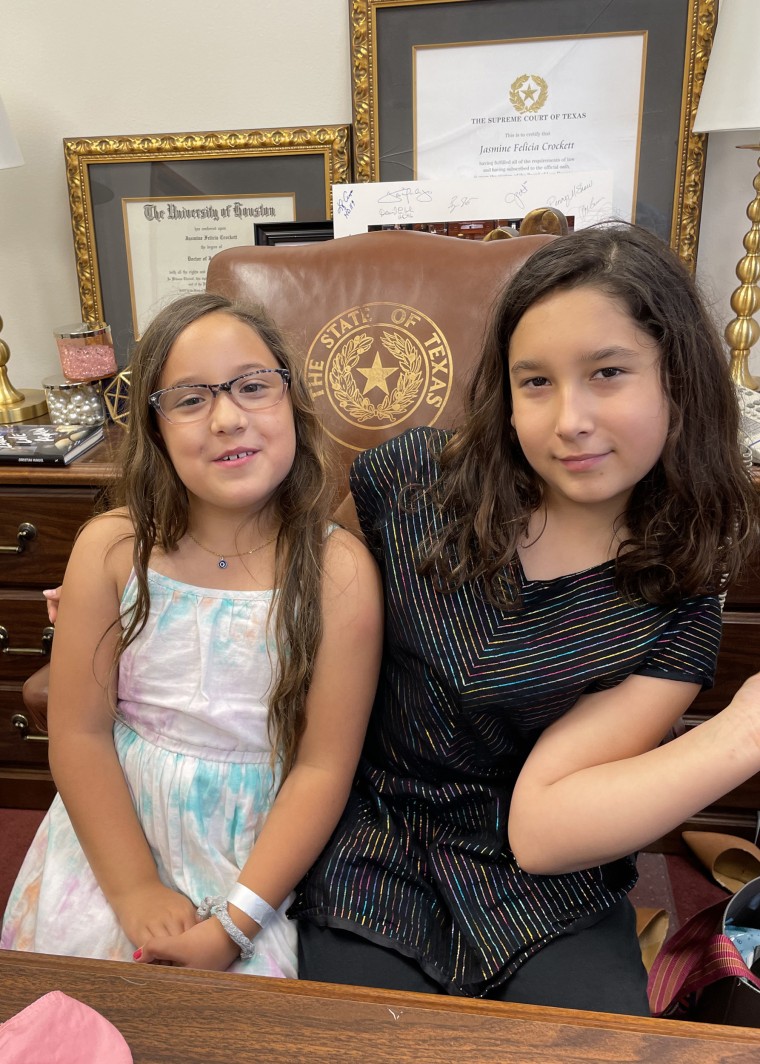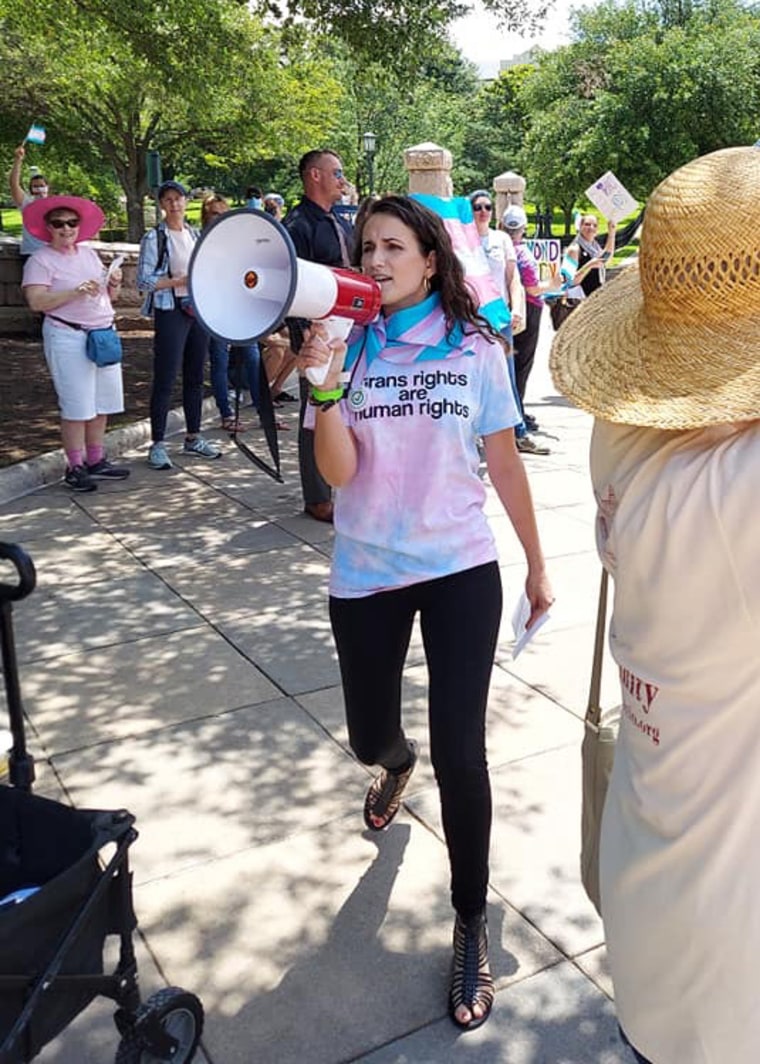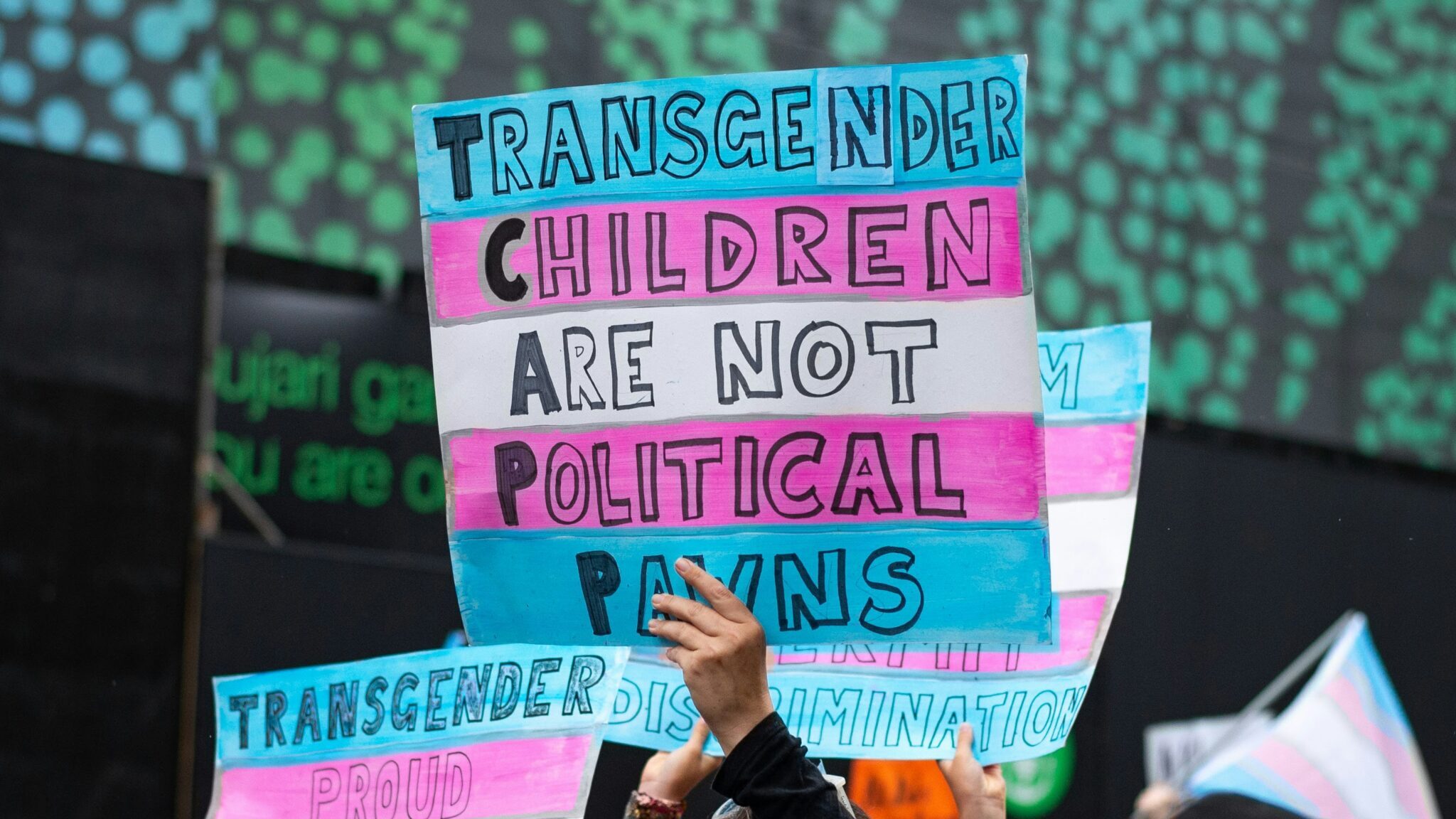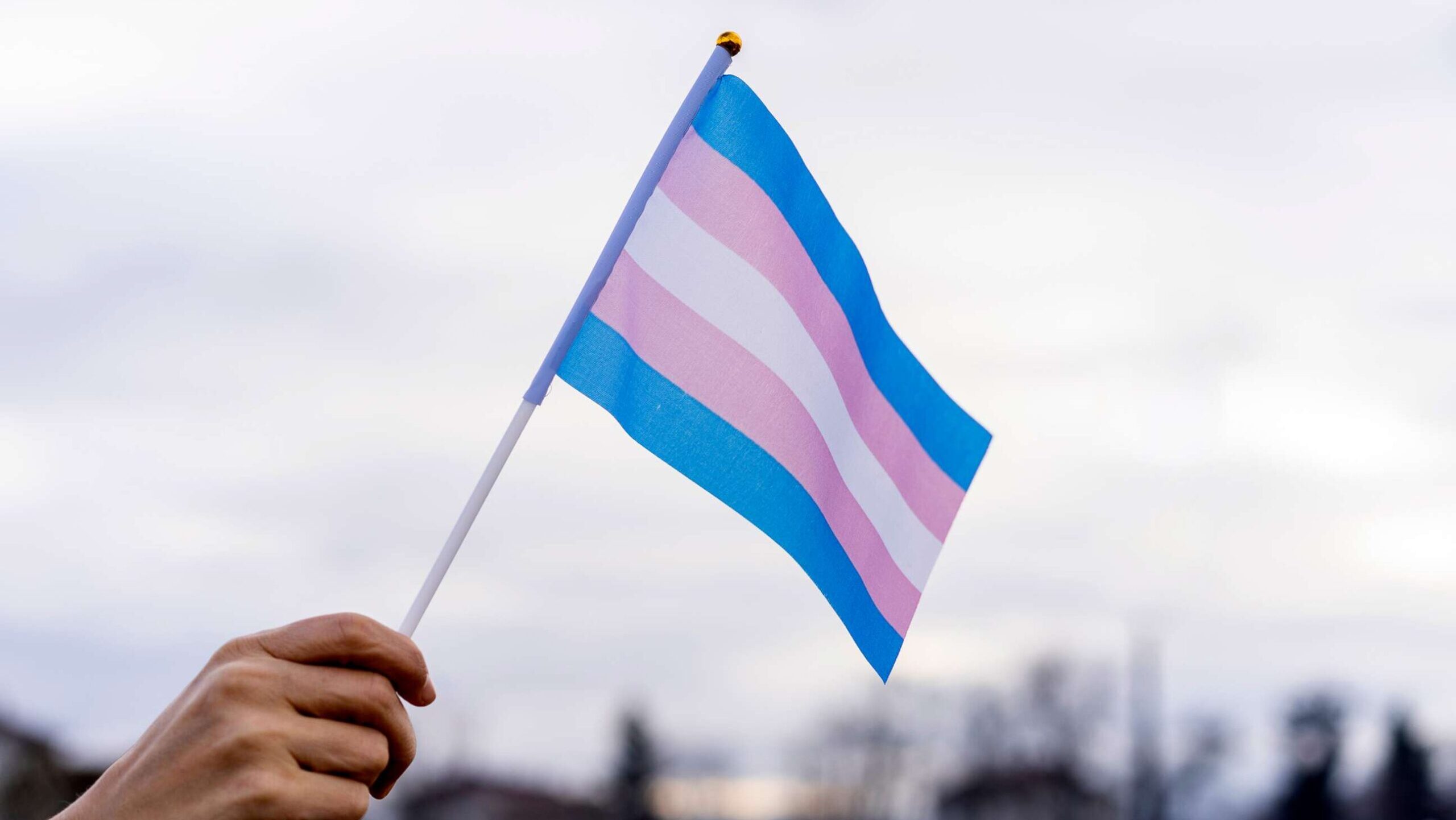Rachel Gonzales has been to the Texas Capitol at least a dozen times since 2017, when she advocated against a bill that would’ve banned her then-6-year-old transgender daughter, Libby, from using the girls’ bathroom.
That bill died in 2017, but the fight hasn’t stopped. Since January, Texas has considered 52 bills that target trans people, particularly youth, according to Equality Texas, an LGBTQ advocacy group in the state.
Parents like Gonzales and advocates have defeated all of the bills so far. But last week, during a third special legislative session, the Texas Senate passed a bill that would ban transgender student athletes in public schools from competing on school sports teams that align with their gender identity, as opposed to their sex assigned at birth.
State Sens. Bob Hall and Charles Perry, both Republicans, also refiled bills last week that would ban health care providers from providing trans children with gender-affirming health care — including therapy — and that could charge parents and doctors with child abuse if they provide such care for trans children.
Gonzales said she will continue to fight the bills, but she added that she is so burnt out by the last nine months that she doesn’t feel like an effective advocate.
“I joke, but it’s not really a joke, that I have definitely lost years off my life from this battle — the amount of stress, the physical manifestation of that stress and the mental anguish,” she said. “It’s so much of negotiating my own feelings in order to assure my kid that she’s going to be OK. But it’s terrifying that I don’t know if it’s going to be OK, and not just for her, but for other kids across the state, kids who cannot safely be out.”
It’s taken a mental and physical toll on her, she said, and other parents and advocates in the state say the same. They say they won’t stop, because they’re doing it for their kids, but they need more help.
‘It takes me hours to fall asleep’
Supporters of trans athlete bans in Texas say they are trying to protect fairness in women’s sports, though — like most supporters of similar bills — they haven’t been able to provide any examples in their state of trans girls jeopardizing fairness, according to LGBTQ advocates.
Proponents of bans on gender-affirming care such as puberty blockers say the care is “experimental” and that children are too young to receive it. But medical experts who provide gender-affirming care say it is supported by all relevant major medical organizations, such as the American Medical Association, the American Academy of Pediatrics and the American Psychological Association. Some of these groups note that gender-affirming care is backed by decades of research and has been used to treat cisgender kids experiencing precocious puberty, for example.

Parents like Gonzales have been fighting the bills so relentlessly because they say the proposals, whether they pass or not, have a devastating effect on trans youth in the state — especially youth who help advocate against them.
Libby, Gonzales’s 11-year-old daughter who is transgender, said the anti-trans bills reintroduced by Republican state senators make her “feel really scared and like they are trying to harm me in very terrible ways.”
She first became an activist at 6 years old, when conservatives in the state tried to pass a bill that would’ve banned her from using the girls’ restroom. Libby said being an advocate is important to her because if she wasn’t, “I would be really hurt, and people wouldn’t hear me.”
“It is very tiring,” she said. “Sometimes it takes me hours to fall asleep just because I’m so scared about these specific bills.”
Rebekah Bryant, who lives in Houston and has been to the Capitol six times this year to advocate against the bills, said they’ve also affected her 8-year-old trans daughter, Sunny.
Sunny has testified against the sports bills twice, in July and August. The first time she testified, she told the Senate committee she likes baseball, soccer, tennis and gymnastics, and that none of her teammates cared that she is trans.
“I’ve been with the same classmates for three years, and none of them knew I was trans until this year,” she said. “When my mom had to speak at the Capitol, they loved me just the same, because kids my age don’t care about that stuff. Kids care about what’s in your heart.”
“Only old people can’t see that,” she added, with a smile. Committee members, including Republicans, laughed, Bryant said.
The second time she testified, Sunny didn’t step up to the podium — which was taller than her — until 1 a.m. Afterward, when she and her mom got back to their hotel room, Sunny sat down on the bed and started crying.
“She said, ‘Why do so many people not like me?’” Bryant said. “And that’s the first time she’s expressed any pain toward this. I was exhausted, and I just said to her, ‘Look, there are way more people there that love you. … There are so many more people in the world that are on your side than aren’t. Those people are the outliers.’”
She said Sunny developed anxiety afterward. Though it’s slowly gone away, Bryant hasn’t brought Sunny to the Capitol again.
Advocates say the rhetoric used in the bills has also had a negative effect on the mental health of transgender — as well as lesbian, gay, bisexual and queer — youth statewide.
For example, between Jan. 1 and Aug. 30, crisis calls from LGBTQ young people in Texas increased 150 percent compared to the same period last year, according to data shared last week by The Trevor Project, an LGBTQ youth suicide prevention and crisis intervention organization. About 4,000, or 36 percent of all contacts from Texas, came from transgender or nonbinary youth.
The Trevor Project added that while the volume of crisis contacts “can not be attributed to any one factor (or bill),” a qualitative analysis of the crisis contacts found that “transgender and nonbinary youth in Texas have directly stated that they are feeling stressed, using self-harm, and considering suicide due to anti-LGBTQ laws being debated in their state.”
The Trans Lifeline, the country’s first transgender crisis hotline, also saw a 72 percent increase in calls from Texas in May — when state lawmakers first considered about a dozen anti-trans bills — when compared to May 2020, according to data shared with NBC News. In July, when the legislation was reconsidered, Trans Lifeline saw a 19 percent increase in calls from Texas.
Adri Pèrez, policy and advocacy strategist for LGBTQ equality at the American Civil Liberties Union of Texas, said it’s unclear whether Texas’ trans athlete ban will pass the House and become law and that its passage “shouldn’t be the focal point.”
“The larger issue, I think, is out of the state of Texas there is a lot of misinformation about transgender people and transgender youth, specifically,” Pèrez said. “The work is not necessarily inside of the Texas Legislature; it’s outside of it. And what we’re doing to help humanize trans people and trans youth to those who have never met a transgender person or a transgender kid, that would be the most effective firewall for these bills. It’s not letting that misinformation take hold at all.”
Whether someone knows a transgender person can significantly affect their views on legislation such as trans athlete bans, according a survey released Thursday by the nonprofit Public Religion Research Institute. A slim majority of Americans who know a transgender person (52 percent), compared to one-third of Americans who do not know anyone who is transgender (33 percent), believe that a transgender girl should be allowed to compete in high school sports with cisgender female students.
PRRI also noted that support for trans people participating in sports has declined since 2018. About one-third, or 36 percent, of Americans believe that trans girls should be allowed to participate in sports with their cisgender classmates, compared to 50 percent in 2018.
Physical, mental and financial strain
Parents who are transgender advocates say Texas’ last few legislative sessions have been particularly difficult for them, too.
Bryant said this is the first year she’s become more active, and it has taken an emotional and financial toll on her family. She said she has to take off work to travel to the Capitol, which is about a 3 1/2-hour drive away, and she often has to book a hotel room. All told, she said she’s spent close to $3,000 going back and forth to the Capitol just this year.

“It’s just so draining, because it’s not only just sitting there and waiting, but it’s sitting there and listening to people lie about you and your family — people that have never met a person who’s trans in their life and really haven’t walked the walk that all of us have,” she said.
Recently, many parents and advocates have been hitting “a wall,” said Linzy Foster, who is from Austin and has been to the Capitol about a dozen times this year to advocate on behalf of her 7-year-old trans daughter.
“The general population who usually are all on board and showing up and fighting for these things, they’re getting fatigued, and there’s also so many things to fight now,” she said. “We’re beginning to feel more and more lonely.”
Many of the advocates described being at the Capitol as traumatic. Annaleise Cothron, whose 8-year-old is nonbinary, said one day she went to the Capitol and the supporters of anti-trans bills called her child “a freak” and “disgusting.”
“While I would never tell my child that, just hearing that from somebody else is really emotionally taxing, and my child doesn’t deserve that,” she said. “People need to understand that’s the level of vitriol that we’re facing just going to the Capitol to say, ‘Please leave us alone. Please leave our community alone.’ This isn’t about politics; this is about human beings.”
More than just sports
Though the parents and advocates believe that trans kids have a right to play on the sports teams that match their gender identity, they said their advocacy is about more than just sports.

“Just the conversation of whether or not my child should exist in public school sports and whether or not other kids should bully them for who they are — that’s the conversation that this legislative body is inviting by entertaining these bills,” Cothron said.
She said the other bills that Republicans have reintroduced or plan to reintroduce that could charge her with child abuse for providing her child with access to gender-affirming care prove that the conversation is about more than fairness in sports.
“This is about the broader conversation of saying whether or not a transgender child should exist in Texas and access public services,” she said.
For now, the parents say they are leaning on each other for support.
“The only reason I’m doing OK, to be honest with you, is because in all of this I have met these amazing people in this community who show up, and we support one another,” Foster said. “We have moments of levity even in the trauma that we’re dealing with when we’re in the Capitol, being able to make each other laugh, knowing that you’re loved, knowing that you’re supported. That is the only thing that’s keeping me going.”
The post appeared first on NBC News.




